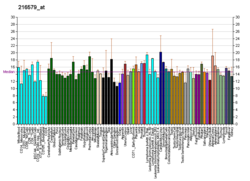
KNOWPIA
WELCOME TO KNOWPIA
Summary
Gap junction beta-4 protein (GJB4), also known as connexin 30.3 (Cx30.3) — is a protein that in humans is encoded by the GJB4 gene.[5]
| GJB4 | |||||||||||||||||||||||||||||||||||||||||||||||||||
|---|---|---|---|---|---|---|---|---|---|---|---|---|---|---|---|---|---|---|---|---|---|---|---|---|---|---|---|---|---|---|---|---|---|---|---|---|---|---|---|---|---|---|---|---|---|---|---|---|---|---|---|
| Identifiers | |||||||||||||||||||||||||||||||||||||||||||||||||||
| Aliases | GJB4, CX30.3, EKV, gap junction protein beta 4, EKVP2 | ||||||||||||||||||||||||||||||||||||||||||||||||||
| External IDs | OMIM: 605425 MGI: 95722 HomoloGene: 7339 GeneCards: GJB4 | ||||||||||||||||||||||||||||||||||||||||||||||||||
| |||||||||||||||||||||||||||||||||||||||||||||||||||
| |||||||||||||||||||||||||||||||||||||||||||||||||||
| |||||||||||||||||||||||||||||||||||||||||||||||||||
| |||||||||||||||||||||||||||||||||||||||||||||||||||
| |||||||||||||||||||||||||||||||||||||||||||||||||||
| Wikidata | |||||||||||||||||||||||||||||||||||||||||||||||||||
| |||||||||||||||||||||||||||||||||||||||||||||||||||
References edit
- ^ a b c GRCh38: Ensembl release 89: ENSG00000189433 – Ensembl, May 2017
- ^ a b c GRCm38: Ensembl release 89: ENSMUSG00000046623 – Ensembl, May 2017
- ^ "Human PubMed Reference:". National Center for Biotechnology Information, U.S. National Library of Medicine.
- ^ "Mouse PubMed Reference:". National Center for Biotechnology Information, U.S. National Library of Medicine.
- ^ "Entrez Gene: GJB4 gap junction protein, beta 4".
Further reading edit
- Andrew L Harris; Darren Locke (2009). Connexins, A Guide. New York: Springer. p. 574. ISBN 978-1-934115-46-6.
- Gregory SG, Barlow KF, McLay KE, et al. (2006). "The DNA sequence and biological annotation of human chromosome 1". Nature. 441 (7091): 315–21. Bibcode:2006Natur.441..315G. doi:10.1038/nature04727. PMID 16710414.
- Common JE, O'Toole EA, Leigh IM, et al. (2006). "Clinical and genetic heterogeneity of erythrokeratoderma variabilis". J. Invest. Dermatol. 125 (5): 920–7. doi:10.1111/j.0022-202X.2005.23919.x. PMID 16297190.
- Gerhard DS, Wagner L, Feingold EA, et al. (2004). "The status, quality, and expansion of the NIH full-length cDNA project: the Mammalian Gene Collection (MGC)". Genome Res. 14 (10B): 2121–7. doi:10.1101/gr.2596504. PMC 528928. PMID 15489334.
- Ota T, Suzuki Y, Nishikawa T, et al. (2004). "Complete sequencing and characterization of 21,243 full-length human cDNAs". Nat. Genet. 36 (1): 40–5. doi:10.1038/ng1285. PMID 14702039.
- Plantard L, Huber M, Macari F, et al. (2004). "Molecular interaction of connexin 30.3 and connexin 31 suggests a dominant-negative mechanism associated with erythrokeratodermia variabilis". Hum. Mol. Genet. 12 (24): 3287–94. doi:10.1093/hmg/ddg364. PMID 14583444.
- Richard G, Brown N, Rouan F, et al. (2003). "Genetic heterogeneity in erythrokeratodermia variabilis: novel mutations in the connexin gene GJB4 (Cx30.3) and genotype-phenotype correlations". J. Invest. Dermatol. 120 (4): 601–9. doi:10.1046/j.1523-1747.2003.12080.x. PMID 12648223.
- Strausberg RL, Feingold EA, Grouse LH, et al. (2003). "Generation and initial analysis of more than 15,000 full-length human and mouse cDNA sequences". Proc. Natl. Acad. Sci. U.S.A. 99 (26): 16899–903. Bibcode:2002PNAS...9916899M. doi:10.1073/pnas.242603899. PMC 139241. PMID 12477932.
- López-Bigas N, Melchionda S, Gasparini P, et al. (2002). "A common frameshift mutation and other variants in GJB4 (connexin 30.3): Analysis of hearing impairment families". Hum. Mutat. 19 (4): 458. doi:10.1002/humu.9023. PMID 11933201.
- Manthey D, Banach K, Desplantez T, et al. (2001). "Intracellular domains of mouse connexin26 and -30 affect diffusional and electrical properties of gap junction channels". J. Membr. Biol. 181 (2): 137–48. doi:10.1007/s00232-001-0017-1. PMID 11420600. S2CID 6408361.
- Macari F, Landau M, Cousin P, et al. (2000). "Mutation in the gene for connexin 30.3 in a family with erythrokeratodermia variabilis". Am. J. Hum. Genet. 67 (5): 1296–301. doi:10.1016/S0002-9297(07)62957-7. PMC 1288569. PMID 11017804.
- Hennemann H, Dahl E, White JB, et al. (1992). "Two gap junction genes, connexin 31.1 and 30.3, are closely linked on mouse chromosome 4 and preferentially expressed in skin". J. Biol. Chem. 267 (24): 17225–33. doi:10.1016/S0021-9258(18)41916-3. PMID 1512260.
- Hacham-Zadeh S, Even-Paz Z (1978). "Erythrokeratodermia variabilis in a Jewish Kurdish family". Clin. Genet. 13 (5): 404–8. doi:10.1111/j.1399-0004.1978.tb04138.x. PMID 148984. S2CID 46050096.







